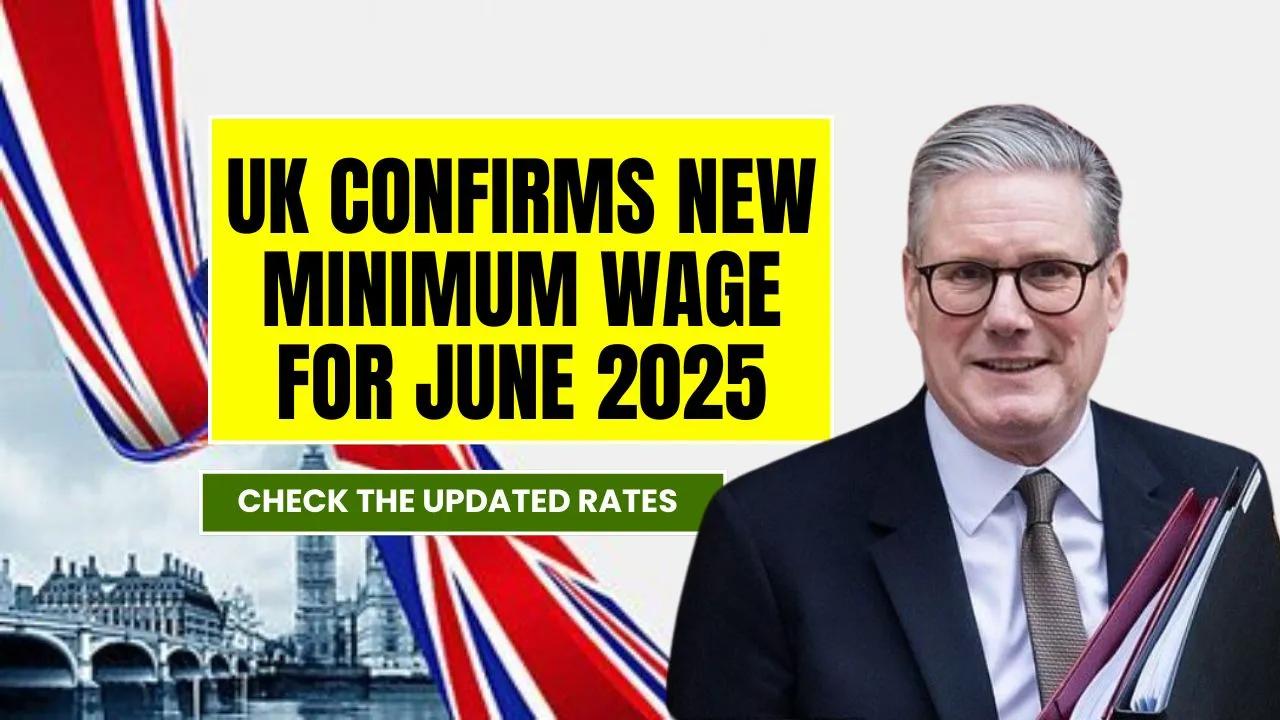UK minimum wage June 2025: With inflation still pressing on household budgets, the UK government has taken decisive action by confirming an increase in the national minimum wage effective from June 2025. Aimed squarely at workers in entry-level roles across sectors like hospitality, retail, and social care, this wage update reflects a growing commitment to promoting fair pay, reducing in-work poverty, and ensuring economic resilience.
The UK minimum wage June 2025 update isn’t just about a small raise—it signals a shift toward greater financial stability for younger workers and apprentices. By widening eligibility and offering meaningful pay boosts, this change meets immediate needs while supporting long-term economic equality.
UK minimum wage June 2025
The UK minimum wage June 2025 update marks a crucial step forward in pay fairness and economic inclusivity. One of the most notable changes is the lowering of the National Living Wage eligibility age from 23 to 21. This adjustment brings thousands of younger workers into the higher wage bracket sooner, providing them with a stronger financial foundation early in their careers. Additionally, significant percentage increases have been applied across all other categories, including youth workers, apprentices, and the accommodation offset.
These updates are designed to combat income inequality and respond to rising living costs that have heavily impacted lower-paid sectors like hospitality, retail, and care services. By boosting earnings across diverse worker groups, the government aims to improve financial stability, reduce employee turnover, and close the gap in earnings between age groups. For workers and employers alike, these changes are a signal of the UK’s push toward a more resilient and fair wage economy.
Overview Table
| Worker Category | 2024 Rate | June 2025 Rate | Increase (%) |
| National Living Wage (21+) | £11.44 | £11.95 | 4.5% |
| 18–20-year-olds | £8.60 | £9.15 | 6.4% |
| 16–17-year-olds | £6.40 | £6.90 | 7.8% |
| Apprentices | £6.40 | £6.95 | 8.6% |
| Accommodation Offset (daily) | £9.99 | £10.50 | 5.1% |
Breakdown
Here’s how the updated minimum wage structure will work from June 2025:
- National Living Wage for Ages 21+: Now £11.95 per hour, up from £11.44—offering a direct boost to those in early adulthood.
- 18–20-Year-Olds: With a 6.4% increase, hourly pay rises to £9.15.
- 16–17-Year-Olds: Those under 18 will earn £6.90 per hour—a 7.8% increase.
- Apprentices: Seeing the largest percentage rise (8.6%), apprentices will be paid £6.95 per hour.
- Accommodation Offset: Daily offset for hospitality or care workers increases by 5.1%, reaching £10.50.
This update also recalibrates the National Living Wage eligibility to start at age 21, benefiting those entering the workforce earlier.
Benefits
Workers stand to gain in several ways:
- Higher Annual Income: Full-time employees can expect to earn an extra £600–£1,000 year-over-year.
- Financial Confidence: More reliable pay helps with rent, food, transit, and savings.
- Reduced Reliance on Assistance: Better wages lessen dependency on state support, increasing self-sufficiency.
- Narrowed Youth Wage Gap: The larger increases for apprentices and younger workers promote wage equity.
This wage boost strengthens worker autonomy and provides financial breathing space as living costs continue to rise.
Employers
Employers will need to adapt promptly to comply:
- Update Payroll Systems: Ensure all pay structures reflect the new wage rates.
- Revise Job Contracts: Adjust employment terms and notify staff of updates.
- Budget Planning: Calculate increased wage expenditure and assess pricing impact, if applicable.
- Communicate Clearly: Use staff meetings or bulletins to explain the changes and ease transition.
Despite potential short-term cost increases, many businesses find fair wages improve staff retention, morale, and output.
Outlook
This wage revision is part of a strategic push toward a high‑wage, high‑skill, high‑productivity workforce. With inflation and energy prices still a burden, increasing pay is one of the most direct ways to cut financial strain for lower-income workers.
The UK minimum wage June 2025 update offers immediate relief, while encouraging broader societal benefits—reducing poverty rates, boosting workplace motivation, and contributing to economic recovery.
Legal and Enforcement
From June 2025, minimum wage rates will be enforceable by HM Revenue & Customs (HMRC) under the Department for Business and Trade. Employers who fail to comply may face penalties, wage back-pay demands, and reputational harm. Keeping accurate payroll records and documenting contract changes are essential to avoid fines and ensure transparent business practices.
Broader Economic Significance
By raising the lower wage floor, the government aims to lift living standards at a national scale. The policy signals economic intent—supporting wage-driven growth rather than relying on public spending alone.
This wage reform also helps address income inequality and positions younger workers to thrive financially, especially as cost of living continues to climb.
Future Prospects
Looking ahead, the government plans to increase the National Living Wage toward two-thirds of median earnings by 2026. This path suggests further wage increases, aiming to build a pay structure that provides stability, rewards skill development, and reduces wage stagnation.
Cities and communities where low-wage industries are common stand to see major improvements in household income, regardless of sector or region.
FAQs
When will the new rates take effect?
The updated minimum wage rates begin in June 2025.
Who qualifies for the National Living Wage?
Workers aged 21 and over will be eligible under the new structure.
Which group receives the largest pay increase?
Apprentices, who will see an 8.6% rise in pay.
How will these changes be enforced?
HMRC will oversee compliance, with penalties for employers who pay below the minimum wage.
Can these increases improve living standards?
Yes—workers earn more, boosting budgets and potentially reducing financial stress.
Final Thoughts
The UK minimum wage June 2025 update changes more than paychecks. By raising the hourly wage, widening eligibility, and prioritizing youth and apprenticeships, this policy aims to nurture a more equitable, resilient workforce. As inflation remains a concern, these improvements help restore spending power and encourage economic independence.
Call to Action
Are you employed, hiring, or managing payroll? Review your wage practices now to make sure you’re ready. Share this article with colleagues, unions, and HR teams to spread awareness. For support on compliance, legal guidance, or running staff training sessions, visit the government’s official minimum wage page or contact HMRC. June 2025 brings fairer pay—let’s make the most of it.
















